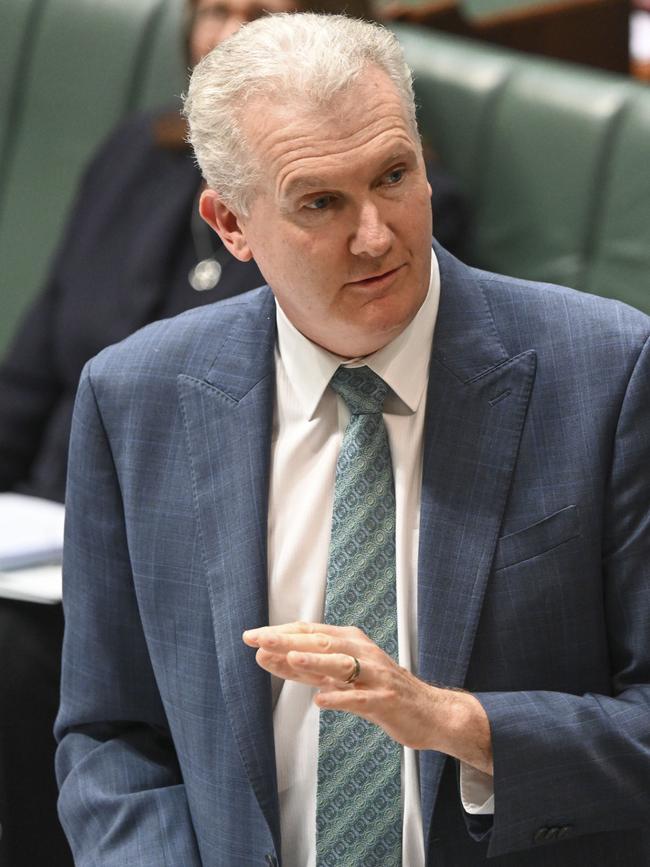BCA wage underpayment claim sparks new stoush between business and Labor
The Business Council of Australia has blamed the complexity of the awards system for most cases of underpayment, prompting a rebuke from the Workplace Relations Minister.

The Business Council of Australia has blamed the complexity of the awards system for many cases of wage underpayment, prompting a rebuke from Workplace Relations Minister Tony Burke in a fresh battle between the Albanese government and the corporate sector.
The BCA has called for a reduction of the 121 award categories and for the industrial rules to be rewritten so they are “clear, easy to understand and in plain English so employers and employees are aware of their responsibilities and entitlements”.
The peak corporate body is arguing staff underpayments are “very often the result of unintended errors due to the complexity of the awards”.
In its submission to the Fair Work Commission’s review into awards, the BCA said it was not only small businesses that were inadvertently breaking employment laws because the industrial relations system was difficult to navigate.
“Underpayments occur not just in small businesses with lower HR capacities and less access to advice, but also in major organisations … despite making considerable investments in meeting their payment obligations,” the submission says.
“If Australia wants to reduce underpayments, award quality, consistency, complexity, and subjectivity need to be acknowledged and addressed.”

The BCA used the example of the complexity within the 105-page retail industry award, which “effectively sets out more than 1400 separate minimum rates of pay, applicable to different classifications, modes of employment, ages and training arrangements, and hours or days worked”.
But Mr Burke said the complexity of the awards system was no excuse for underpaying staff, accusing some bosses of not taking workplace laws seriously enough.
“If everyone treated workplace law as seriously as tax law, health regulations and planning laws, there would be far fewer underpayments,” Mr Burke said.
“These other laws are all far more complex than paying someone properly.”
In another shot at big business on Sunday, Agriculture Minister Murray Watt accused major supermarkets of paying farmers unfair prices for produce.
“I think all Australians expect the big supermarket chains to pay our farmers a fair price, and I think in too many instances that’s not occurring,” Senator Watt said, adding the government would look to crackdown on the issue through a review of the Food and Grocery Code.
The Albanese government passed laws in December making it a criminal offence carrying a penalty of up to 10 years in jail for employers who deliberately underpaid their staff, after a string of companies admitted they had failed to pay workers the correct entitlements.
While companies including 7-Eleven, Qantas, Bunnings, Woolworths and the Commonwealth Bank have underpaid workers in the past five years, the federal government’s Department of Employment and Workplace Relations underpaid 99 staff more than $60,000 between July 2022 and August 2023.
With hostilities growing between business and the Labor government, BCA chief executive Bran Black said it was good the government had commissioned a review of the awards system, which he described as retaining “outdated and obsolete concepts such as the repair of horse-drawn carriages”.
But Mr Black said any benefits of the review were being undermined by the government’s broader industrial relations agenda that was putting “jobs and higher wages for employees at risk”. Business leaders were furious with a December deal between Labor and the Senate crossbench on legislation forcing employers to pay labour hire workers the same as direct employees doing the same work.
The corporate sector also opposes further IR changes the government is aiming to legislate this year, including making it easier for casual workers to convert to permanent employment and setting minimum workplace standards for gig workers.
“The government is unfortunately adding significant complexity to our employment system with the IR changes passed in December, and the remaining legislation proposed for February,” Mr Black said.
“The government’s legislation in February will make businesses less productive and that puts jobs and higher wages for employees at risk. It’s a contradiction to seek to simplify awards through the review while at the same time burdening businesses with complexity and costs through new workplace relations changes.”
Jim Chalmers on Sunday declared the government’s industrial relations agenda was part of the reason wages increased by 4 per cent in the year to September 2023, the highest annual rise since 2009.
The government analysis showed wages in the lowest paid and second lowest paid categories increased by 6.7 per cent and 5 per cent respectively.
“At a time when cost-of-living pressures are putting working families under the pump, this data shows that wages are growing faster under Labor than they have in nearly 15 years and lowest paid workers are receiving the biggest boost,” the Treasurer said. “Securing meaningful, responsible, sustainable wages growth is central to our economic plan – and our approach has been tailored to support lowest paid workers doing it toughest.”
ACTU acting secretary Joseph Mitchell said there were no excuses for businesses underpaying their workers.
“Big business have been using complex legal mechanisms to create loopholes, drive down wages and undermine conditions, all while spending big to keep these complex loopholes around,” Mr Mitchell said.
“It beggars belief that BCA claim complexity is driving wage theft when big businesses they represent, like Commonwealth Bank, have been caught out knowingly underpaying their workers millions.
“Working people are struggling from corporate price gouging and big businesses keeping wages low to amass record profits.”







To join the conversation, please log in. Don't have an account? Register
Join the conversation, you are commenting as Logout